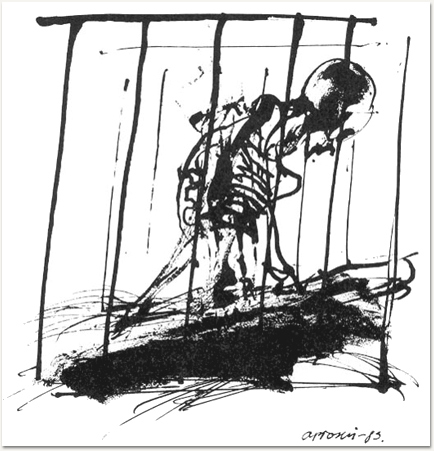The hunger artist starves himself willfully, for forty days in a cage for his living. In a sense, he is a professional at fasting, fasting has become his art. People from all over town come to see this man "perform", and he in return talks to them and answers their questions, he is content. Yet these people seem to think that the hunger artist is secretly eating, not believing in his fast is honest. This doubt of the people annoys the hunger artist more than anything else, his audience, his fans don't believe in him? He depends on his fans, needing them to believe him, to understand him, he needs them to applaud his performances, to be amazed by him, without that, what is the point of staying hungry? What is the point of fasting for so long, when it won't be acknowledged? Yet every artist, whether they're authors, visual artists, musicians, or hunger artists, starts out wanting to make his/her art for themselves, to express themselves. Here we see that the hunger artist is living in a paradox, making his art for himself, not conforming, not knowing how to express himself in any other way, yet if the art that is produced is not accepted or liked by the given audience then why create it, why make it your living, why create art, why starve? This paradox that essentially defines the hunger artist's life, is the reason for his unhappiness.
A Hunger Artist, is written by Franz Kafka, in 1922.
The story of the hunger artist is parallels the life of Jesus Christ. Like the hunger artist, Jesus "performs" miracles for his people, yet no one has faith, no one believes in this miracles, his followers hold suspicions. (Jesus also fasts for forty days, which Kafka mirrors in A Hunger Artist.) Both Jesus, and the hunger artist, want the belief of their fans, or followers, yet they do nothing to prove themselves to them because they want the belief to be genuine.
Kafka's story could also be an allegory to his own life as an artist, a writer. As any writer, or artist starts off writing for themselves, his writing keeps true to his own beliefs, he expresses himself through his writing. Now if one of his pieces is extraordinary, the writer has fame. But the next piece he creates may not be as great, now the writer must think of new ways to entertain his audience, but by having to "entertain" them, he is being ruled by them. The writer is no longer his own, his words, his pieces, aren't for him, but for unknown readers who will judge him in the harshest ways. This realization is not a happy one, yet if the writer wants writing to be his living, if he wants money, food, and other necessities, then the writer has to conform. Here we see an allusion with the hunger artist, living in somewhat of a paradox, the writer cannot be without his audience, or but strives to keep his individuality.
Here we can also see an a parallel to Hunger by Knut Hamsen. The protagonist also lives in this paradox, his pride does not allow him to comply with how the editors want him to write, he never lets himself be restricted, but realizes that without changing his writing, no one will take them, leaving him poor and extremely hungry. Yet this hunger and poverty is self inflicted, and could be easily changed, here we see how the protagonist in Hunger differs from the hunger artist, or Jesus, as he does not need his audience, because of his pride, he doesn't have fans, or followers but he never really wanted them either.

No comments:
Post a Comment